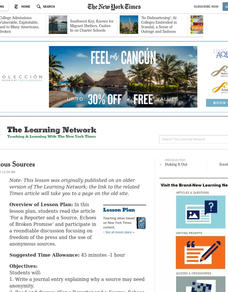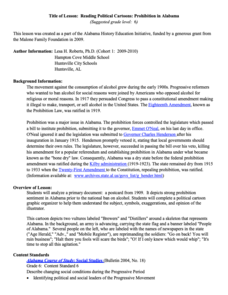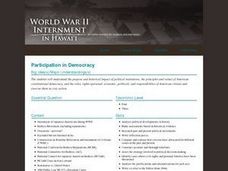Curated OER
An Introduction to The Catcher in the Rye
Who is J.D. Salinger? Give your class some information on the famous recluse before reading his only novel, The Catcher in the Rye. His life and works are detailed, and there are even a few slides dedicated to controversies and criticism...
National Association of Teacher Educators for Family and Consumer Science
Consumerism in the Classroom: Effective Strategies for Today's Teenage Consumers
Help class members become savvy consumers with a series of activities that has them analyzing marketing strategies, comparing the value of brand name versus off-brand clothing, and considering the advantages and disadvantages of shopping...
DocsTeach
Celebrating America's Bicentennial in 1976
Budding historians learn the process of preserving history in an interesting hands-on-activity. The resource walks academics through the process of restoring the Declaration of Independence. Individuals place a series of images in...
Curated OER
The Insurgency In Iraq: A Quandary for the U.S.
Students read articles, conduct Internet research and participate in a mock debate to explore the pros and cons of withdrawing from Iraq or remaining in conflict with the insurgency. They consider the difficulties of consensus building...
Curated OER
Anti-Bullying Efforts in the Elementary Classroom
Help prevent bullying from ever beginning with these simple strategies for implementing class meetings.
Curated OER
Anonymous Sources in the Media
When do people ask for anonymity? Why? After reading the New York Times article "For a Reporter and a Source, Echoes of Broken Promise," young readers participate in a roundtable discussion focusing on freedom of the press and the use of...
Core Knowledge Foundation
The Human Body Tell It Again!™ Read-Aloud Anthology
A read-aloud anthology showcases various stories about the human body. Scholars participate in lessons that introduce a reading, listen to and discuss the reading, then complete in-class and at-home practice.
Core Knowledge Foundation
The Ancient Greek Civilization Tell It Again!™ Read-Aloud Anthology
A read-aloud anthology explores the ancient greek civilization. Over four weeks, second graders explore Mount Olympus, Sparta, Athens, the olympic games, philosophers, and Alexander the Great. Scholars listen to and discuss a reading,...
iCivics
The "Federal" in Federalism
How are states in the United States related to each other? Does the government bind them together? Do states have different governments? After reading about federal power as a whole group, your class members will participate in a...
Curated OER
Relationships for Students in Middle School
Boundaries are important in relationships, no matter how close the relationship is. Middle schoolers explore the ideas of boundaries and personal space with two units about relationships. After discussing the boundaries in their own...
Media Smarts
Forensic Science Crimes Dramas
How do TV shows present criminology—is it realistic? High schoolers research crime dramas and participate in class discussion about topics such as who exists as the target audience and the values the shows communicate. They also research...
Alabama Department of Archives and History
Reading Political Cartoons: Prohibition in Alabama
What makes a cartoon political? The lesson plan provides learners with political cartoons and teaches how to analyze them using a five-step process. Scholars also complete a hands-on activity and participate in group discussions to...
Alabama Department of Archives and History
Changes in Transportation over Time
Planes, trains, and automobiles. How many ways to travel are there? Scholars learn about modes of transportation in the past and how they have changed over time. Budding historians view a timeline, participate in group discussion, and...
American Physiological Society
Why is Kettle Corn Cooked in Copper Pots?
The kitchen — it's not just for eating anymore! Specific heat is often a difficult concept to grasp, so give it context by relating it to cooking. Learners gain experience in the principles of thermal energy transfer by designing an...
College Board
Civic Knowledge and Action in AP U.S. Government and Politics
Vote, it's your civic duty! The high school lesson focuses on voter turnout and civic participation with a series of activities. Young scholars analyze data to discover voter turnout trends, complete worksheets, and participate in group...
Curated OER
Participating in Democracy
Students analyze film clips in class. In this democracy lesson, students identify the differences between civil liberties, democracy and freedom. Students view a video regarding Japanese internment and answer study questions as well as...
Curated OER
New Supreme Court Justice Sworn In
Students react to a series of statements about the Supreme Court, then read a news article about the confirmation of Chief Justice John Roberts. In this current events lesson, the teacher introduces the article with a discussion and...
National Park Service
Should America Have Gone to War in 1812?
Using an incredibly engaging activity and detailed lesson plan, your learners will serve as advisors to President Madison on whether to participate in what would become the War of 1812! Utilize a variety of effective instructional...
Curated OER
Jazz in America
Learners participate in a class discussion about jazz music, compare improvisation with regular conversion, listen to various jazz musicians and compare and contrast their individual sounds.
Captain Planet Foundation
Energy Flow in the Garden
How can you tell what an owl has eaten? Study the food chain and flow of energy in an ecosystem by dissecting an owl pellet and noting the bones found inside. Additionally, the lesson plan includes a game about consumers and producers...
Federal Reserve Bank
Invest in Yourself
What are the different ways that people can invest in their human capital for a better future? Pupils participate in an engaging hands-on activity and analyze data regarding unemployment, the ability to obtain an education, and median...
Smithsonian Institution
The Birth of an Icon: Learning and Performing the Origins of the Drum Set and Early Jazz Drumming in New Orleans, Louisiana
Bass drum, snare drum, tom-toms, cymbals. Perched behind their drum sets, wielding their drum sticks and wire brushes, drummers lay the grove and are the heartbeat of a band's performance. A dynamic lesson introduces young musicians to...
Curated OER
A Garden of Verses: Poems About Class Gardens
Young scholars explore botany by participating in a language arts activity. In this garden poetry lesson, students read the classic poem "Mary, Mary Quite Contrary" and discuss the imagery and rhyming methods used. Young scholars examine...
Carolina K-12
African Americans in the United States Congress During Reconstruction
The Civil Rights Act of 1866, which granted citizenship to all males in the U.S., resulted in the first African Americans to be elected to Congress. Class members research 11 of these men, the challenges they faced, and craft...

























